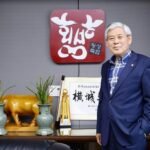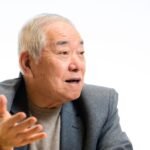Celltrion Group founder and Chairman Seo Jung-jin (on left) visiting the Celltrion booth at DDW 2024
WASHINGTON DC – Celltrion Inc., South Korea’s biosimilar giant seeking to transform into a novel drug developer, is going after a well-known pharmaceutical company in Europe to boost its future growth, said its chief.
“We are pursuing an M&A with one of famous pharma companies in Europe. If the negotiation is successful, we will disclose its name within this year,” Celltrion Group founder and Chairman Seo Jung-jin said in an interview with The Korea Economic Daily at Digestive Disease Week 2024 on Tuesday (local time).
“But there is a hurdle, approval from the related local authorities (for the deal), which we must secure first.”
Seo was attending the world’s most prestigious forum for professionals working in gastroenterology, hepatology, GI endoscopy, gastrointestinal surgery and related fields. The meeting was held in Washington DC from May 19 to 21.
Celltrion’s takeover attempt in Europe comes as another deal to acquire a major Japanese pharmaceutical company is in limbo due to the Japanese authorities’ reluctance to let a Korean company own a Japanese company, the chairman said.
Seo has been betting on M&As with major global pharmaceutical companies for future growth since he returned to management last year.
As part of efforts to boost its growth, the Korean biosimilar giant will also accelerate its transition into a novel drug developer, Seo reiterated, saying that the company plans phase 1 clinical trials of its own antibody-drug conjugate (ADC) next year.
(Graphics by Sunny Park)
ADCs are dubbed the “biological missile” for targeted cancer therapy. They also have enormous potential to treat other diseases.
Besides ADCs, Celltrion is also developing platform technologies for bispecific and trispecific antibody therapies, orally administered antibodies and messenger RNA (mRNA), said Seo, adding that it is mulling development of diabetes and obesity treatments as well as non-narcotic painkillers.
CELLTRION EYES 50% OF THE US CROHN’S DISEASE THERAPY MARKET
Celltrion’s aspiration to become a novel drug developer is grounded on its confidence in biosimilar development.
Biosimilars are products that have been demonstrated to be similar in efficacy and safety to the originator’s reference product, with the advantage that they are less expensive and promote sustainable access to therapies.
The company has rolled out six biosimilar products – Remsima, Truxima, Herzuma, Remsima SC, Yuflyma and Vegzelma – in the global market since its foundation in 2002.
Their global sales reached 2.1 trillion won ($1.5 billion) in 2023, accounting for nearly all of the company’s entire sales of 2.2 trillion won.
Celltrion booth at DDW2024
Celltrion is bullish about its biosimilar sales worldwide, especially those of its autoimmune disease treatment Zymfentra, a subcutaneous injection type of Remsima SC (infliximab), after its launch in the US in March last year.
“The company has set a target to offer Zymfentra to 150,000 ulcerative colitis patients in the US, about 50% of the country’s entire 300,000 ulcerative colitis patients, by next year,” said Seo.
Under the goal, Celltrion expects to rake in 4.5 trillion won in sales of Zymfentra in 2025, nine times bigger than this year’s projected sales of 500 billion won.
“Zymfentra controls more than 50% of the ulcerative colitis and Crohn’s disease therapy market in Europe, in which it was launched three years ago,” said Seo. “US patients have waited for it for a long time.”
Celltrion’s Zymfentra
Zymfentra is the first and only subcutaneous infliximab approved by the US Food and Drug Administration in 2023.
Subcutaneous injections are used to administer medications between skin and muscle and they can be self-administered.
Such a convenient and easy way to take the medicine, Zymfentra’s sales skyrocketed in Europe during the COVID-19 pandemic.
Seo has been based in the US since his return to the company’s management to actively market Celltrion’s products in the country with various marketing campaigns and face-to-face meetings with doctors across the nation, he said.
“Once the five biosimilars on the pipeline hit the market next year, we will have a complete lineup of 11 products covering all treatments for rheumatoid arthritis and bowel diseases, which could enable us to tap 15 to 20% of the global medical budget,” said Seo.
To deepen the penetration of its medicines in major hospitals in the US, Celltrion is considering selling its biosimilars in bundles, he added.
By Hyun-Ah Oh and Dae-Kyu Ahn
5hyun@hankyung.com
Sookyung Seo edited this article.















